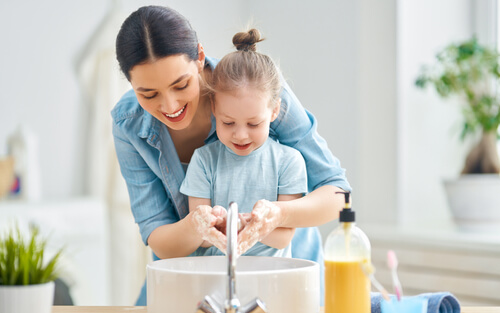Creative Alternatives for Continued Learning for Children with Special Needs
Jan 9, 2022 As a mother of a daughter with autism and intellectual disabilities, I understand the importance of individualized school supports and goals to facilitate learning and skill development.
In This Article
My 18-year-old daughter, Annie, has been enrolled in specialized educational programs and services since she was diagnosed in 2004. A key to Annie’s success is the personalized, hands-on attention she receives in her classrooms, which have an approximate one-to-one student-teacher ratio.
As a result of the COVID-19 pandemic (Read my article: Helping Families with Special Needs during a Public Health Crisis), many schools have shifted to remote instruction, which can be challenging for individuals like Annie who need direct assistance and prompting for optimal learning and skill-building.
Albert Einstein once said:
“In the middle of every difficulty lies opportunity.”
This rings especially true right now. Below are a few creative alternatives for continued learning – at home – to help children with special needs develop essential life skills.
Hygiene
There has never been a more important time to reinforce healthy hygiene habits than during a pandemic. Help children develop daily routines for handwashing; brushing their teeth; washing their face; using deodorant; shaving; or brushing their hair. My daughter loves the song “Close to You” by the Carpenters, so I downloaded a fun app and created a handwashing visual aid to make sure she is washing her hands long enough.

Cooking
Teach your child how to make a breakfast (e.g., cereal) or lunch (e.g., sandwiches) with appropriate supervision. Cooking simple foods, like popcorn or scrambled eggs, in the microwave or on the stovetop (if appropriate) can help them learn how to safely follow directions. Note: The Food Network can help youth become familiar with new foods and recipes.
Cleaning and Organizing
No one loves to clean, but it is essential to achieving independence. My daughter has become proficient at vacuuming, washing and folding laundry, loading and unloading the dishwasher, setting the table, and even cleaning her own bathroom – all with a little assistance and a lot of positive reinforcement. Teach your child organizational skills by encouraging them to help you file or shred papers, organize the pantry, make a grocery list, or sort through recycling.

Gardening and Yard Work
What better way to teach children about what “farm-to-table” truly means than by letting them grow their own vegetables (e.g., lettuce, tomatoes, basil). Flowers are a good alternative, requiring activities like potting and watering plants. If your child needs to burn off energy, encourage him/her to help you mow the lawn, pull weeds; sweep up grass; and bag leaves.
Games
Games can help teach youth how to follow directions, take turns, and plan strategies. Take the fun outdoors with yard games like bocce ball, basketball, and corn hole, and help kids improve their gross motor skills. Note: TV game shows like Jeopardy, Wheel of Fortune, and Who Wants to Be a Millionaire also provide an opportunity for interactive learning.
For engaging and fun speech learning activities give Speech Blubs a try. Speech Blubs is a language therapy app that was initially developed for children with autism, Down syndrome, and apraxia of speech. Get your 14-day trial now!
Boost Your Child’s Speech Development!
Improve language & communication skills with fun learning!

Letter Writing
Writing letters or sending emails to friends and family is a great way to keep in touch with loved ones, and help children improve their spelling, handwriting/typing and fine motor skills.
Pets
Children can learn about the responsibilities (e.g., feeding, grooming, training) that come with taking care of an animal, as well how to safely and appropriately pet and handle the animal.
If you feel like your child is not ready (or is too young) to take care of a dog or a cat, a pet goldfish is a great low-cost place to start. They’re relatively easy to care for and you have a tonne of options for decorating your tank. As well as your typical ornaments you can even include some goldfish plants in the tank. Most small pets are hyperactive which can sometimes be overwhelming for your child, a well-decorated fish tank gives a slow-paced almost meditative vibe, perfect for adding a bit of zen to your child’s day.

Virtual Tours and Community Experiences
With social distancing measures in place, many museums, national parks, and zoos across the U.S. and around the world are closed, but that doesn’t mean the exploring has to stop. Access a list of virtual field trips you can take from the safety and comfort of your own home. Talk to children about the tours and experiences, and help them make a “wish list” of places they would like to visit. National Geographic’s at-home learning site, Natgeo, and The Smithsonian Science Education Center also offer educational resources to inspire family exploration.
By providing fun and unique continued learning opportunities for your child – at home – you can help him/her develop the skills needed to grow and thrive, and when it comes time to return to the classroom, your child will be positioned for success.
For additional information about helping families with special needs during COVID-19, read the following articles:
- COVID-19: Helping Families with Special Needs during a Public Health Crisis
- Special Needs and Coronavirus: Four Ways to Help Kids and Adults with Special Needs Adapt to Wearing Face Masks during the COVID-19 Pandemic
- COVID-19: Tips for Working from Home (and finding relief) with Your Children Out of School
- Talking to Individuals with Autism about COVID-19
